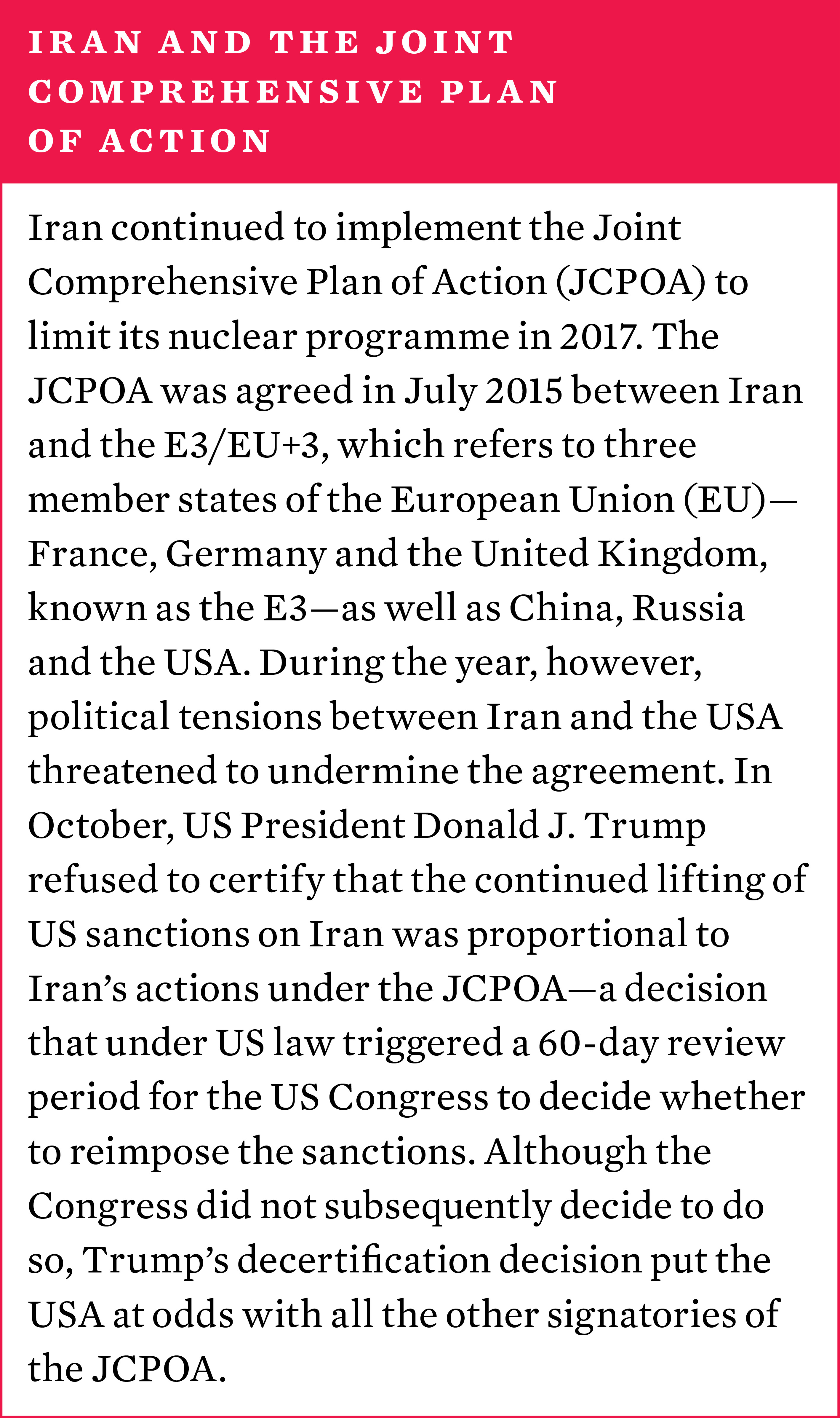7. Nuclear disarmament, arms control and non-proliferation
Overview, Shannon N. Kile and Tytti Erästö [PDF]
I. Treaty of the Prohibition of Nuclear Weapons, Shannon N. Kile [PDF]
II. Russia-United States nuclear arms control, Shannon N. Kile [PDF]
III. Developments in multilateral nuclear disarmament and non-proliferation, Shannon N. Kile [PDF]
IV. International non-proliferation sanctions against North Korea, Shannon N. Kile [PDF]
V. Implementation of the Joint Comprehensive Plan of Action in Iran, Tytti Erästö [PDF]
There was important new momentum behind global efforts to promote nuclear disarmament and non-proliferation in 2017.
Treaty on the Prohibition of Nuclear Weapons
The year was marked by the negotiation and opening for signature of the Treaty on the Prohibition of Nuclear Weapons (TPNW). The treaty is the first legally binding international agreement to comprehensively prohibit nuclear weapons, with the ultimate goal of their total elimination. The opening of negotiations on the treaty had been mandated by a United Nations General Assembly resolution at the end of 2016, which had in turn been motivated by the growing international awareness of the devastating humanitarian consequences of any use of nuclear weapons. These steps reflected the frustration of many non-nuclear weapon states that the nuclear weapon states were not taking seriously their obligation under the 1968 Treaty on the Non-Proliferation of Nuclear Weapons (Non-Proliferation Treaty, NPT) to pursue nuclear disarmament. While proponents of the TPNW acknowledged that it would have no immediate impact on existing nuclear arsenals, they highlighted its long-term normative impact—it would serve to delegitimize and stigmatize nuclear weapons and thereby contribute to achieving the ultimate goal of nuclear disarmament. At the same time, there was a recognition during 2017 that the relationship between the TPNW, the NPT and related agreements would have to be defined over time in order to prevent the fragmentation of nuclear disarmament efforts.

Russian–US nuclear arms control
Russia and the United States continued to implement the 2010 Treaty on Measures for the Further Reduction and Limitation of Strategic Offensive Arms (New START), which places numerical limits on their strategic nuclear forces. However, the prospects for sustaining the progress made in Russian–US nuclear arms control since the end of the cold war appeared to be increasingly in doubt. Neither Russia nor the USA indicated that it would agree to extend New START before its scheduled expiration in 2021. They also showed little interest in negotiating deeper reductions in their nuclear arsenals beyond those mandated by New START. At the same time, the USA continued to allege that Russia was violating an important cold war-era arms control treaty, the 1987 Soviet–US Treaty on the Elimination of Intermediate-Range and Shorter-Range Missiles (INF Treaty), by deploying a new ground-launched cruise missile proscribed by the treaty. These developments come against a background of further deterioration in political relations between Russia and the USA, underscoring fundamental differences in their respective goals and priorities for arms control.
Multilateral arms control
There were also developments during 2017 related to other multilateral treaties and initiatives on nuclear disarmament, arms control and non-proliferation. In February, the Conference on Disarmament (CD), the world’s sole multilateral forum for negotiating arms control and disarmament agreements, renewed efforts to break the deadlock that has left it unable to adopt a programme of work since 2009. It established a working group to take stock of the progress on all CD agenda items and to identify common ground for a programme of work with a negotiating mandate. In May, the first session of the Preparatory Committee for the 2020 NPT Review Conference was convened in Vienna, Austria. There were also events connected with two unresolved items on the multilateral disarmament and non-proliferation agenda: a fissile material cut-off treaty (FMCT), and the 1996 Comprehensive Nuclear-Test-Ban Treaty (CTBT). In July and August, a high-level expert preparatory group met in Geneva, Switzerland, to consider ways to commence negotiations on an FMCT. In September, the 10th Conference on Facilitating the Entry into Force of the CTBT was held in New York, USA.
Sanctions on North Korea
The Democratic People’s Republic of Korea’s (DPRK, or North Korea) programme to develop nuclear and other weapons of mass destruction, in contravention of UN Security Council resolutions, remained a source of grave international concern. During 2017 the Security Council adopted three additional resolutions imposing new or expanded sanctions on North Korea in response to its nuclear weapon and ballistic missile testing activities.